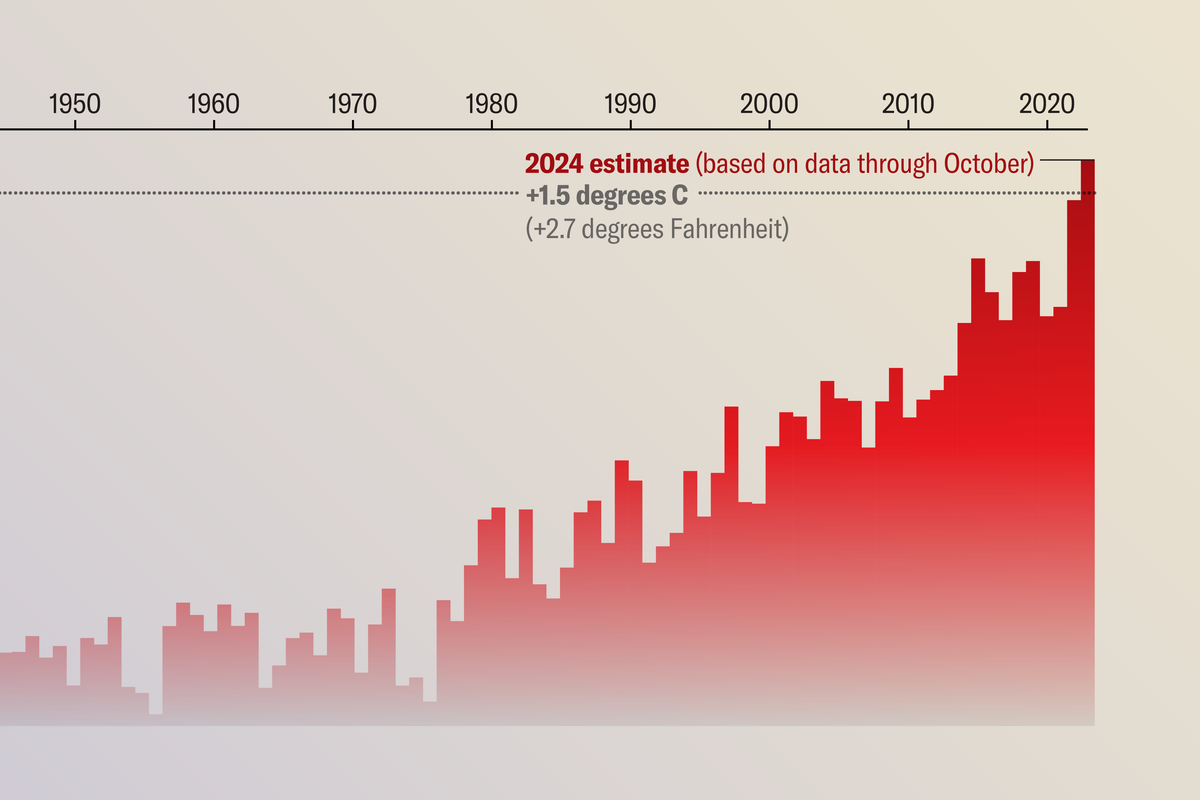
Earth Will Exceed 1.5 Degrees Celsius of Warming This Year
This year won’t just be the hottest on record—it could be the first to surpass 1.5 degrees Celsius. The Paris climate accord aims to keep warming below that level when looking over multiple years
I replied to someone with this but I want to make it its own comment for anybody who is unaware of the dangers of a 1.5c temperature increase:
[NASA](https://science.nasa.gov/earth/climate-change/vital-signs/a-degree-of-concern-why-global-temperatures-matter/): By limiting global warming to 1.5 degrees Celsius, up to half as many people around the planet may experience water stress caused by climate change, depending on future socioeconomic conditions. The degree will vary from region to region. People in river basins, especially in the Middle and Near East, will be particularly vulnerable.
At 1.5 degrees Celsius warming, 6 percent of the report's studied insects, 8 percent of plants and 4 percent of vertebrates will see their climatically determined geographic range reduced by more than half (map highlights areas where monarch butterfly populations are affected).
Warming of 1.5 to 2 degrees Celsius will lead to a reduction of rainforest biomass and will increase deforestation and wildfires. Trees at the southern boundaries of boreal forests will die.
The IPCC Special Report states, with medium confidence, that at an increased level of warming between 1.5 and 2 degrees Celsius, instabilities in the Antarctic ice sheet and/or the irreversible loss of the Greenland ice sheet could lead to multi-meter (greater than 6 feet) sea level rise over a time scale of hundreds to thousands of years.
Ocean oxygen levels will decrease, leading to more “dead zones” — areas where normal ocean waters are replaced by waters with low oxygen levels that won’t support most aquatic life.
Ocean warming, acidification and more intense storms will cause coral reefs to decline by 70 to 90 percent at 1.5 degrees Celsius warming, becoming all but non-existent at 2 degrees warming.
[BBC](https://www.bbc.com/future/article/20231130-climate-crisis-the-15c-global-warming-threshold-explained): In a 1.5C world, many of the deadliest effects of climate change are reduced. Sea level rise is expected to be around 10cm (4in) lower at 1.5C compared with 2C. However, irreversible melting of ice sheets on Greenland and Antarctica could be triggered between 1.5C and 2C, meaning that sea levels would continue to rise well beyond 2100. But it would happen more slowly at 1.5C than 2C, buying time for communities to adapt.
For small island nations and low-lying nations already seeing storms, rising sea levels and degradation of land and reefs, 1.5C would still pose an existential challenge. Loss and damage funding is seen as crucial for the long-term survival and adaptation of small islands and low-lying nations, as well as other nations especially vulnerable to climate change.
Compared with today, a 1.5C world would also be at increased risk of extreme heat, stresses on food production and access to water, and the range of insect-borne diseases such as malaria and dengue fever, among other threats.
The damage done at the 1.5C threshold also depends on *how* we get to 1.5C. If we overshoot 1.5C in the 21st Century and then reduce warming back to 1.5C (an "overshoot"), the risks are greater than if the world gradually stabilises at 1.5C. The peak temperature of the century will also have a big impact on the survival of ecosystems, such as tropical corals.
Overshooting 1.5C is "fast becoming inevitable", according to [a report](https://10insightsclimate.science/wp-content/uploads/2023/12/10NICS-2023-Report_digital.pdf) launched at COP28 by climate and social scientists.
The report, which aims to inform the leaders of the COP28 negotiations, says "minimising the magnitude and duration of overshoot is essential".
It's not just whether we go over the 1.5C threshold that matters, but how long we spend above that level of warming. The longer the world spends in overshoot, the greater the risk of passing crucial climate tipping points, and the greater the damage done to climate-vulnerable societies, ecosystems and economies.
 ”
”

